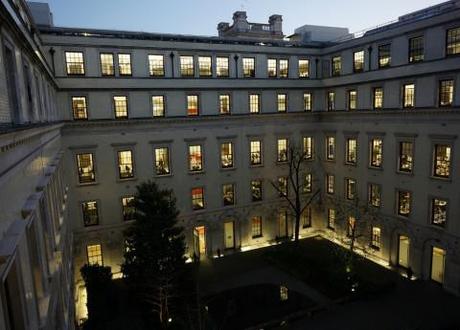
The Treasury, hard at work the night before the Budget was revealed. Photo credit: John Pavel, HM Treasury
Chancellor George Osborne’s Budget, released from its Gladstone case on Wednesday, contained a few contentious and some not-so-contentious points. Here are the highlights:
Income tax
Osborne has shifted around tax bands to ease up on some and drop the hammer on others: The much-discussed 50p top tax rate is actually going to be cut to 45p, a boon to those at the top levels, and the personal income tax allowance will be raised to £9,205 from April 2013, a move designed to put £225 more a year in the pockets of around 24 million people. But at the same time, around 300,000 people will be swept into the higher 40 percent tax rate band, after the threshold is reduced from £42,475 to £41,450.
The real takeaway, according to several angry economics editors on the left, is that this is the Budget that cut the tax burden for the rich – and this following the Occupy protests. Moreover, though it eases the pain for some with lower incomes, it doesn’t help those on the lowest incomes or those who are unemployed, said Larry Elliot at The Guardian. “Hardly progressive,” sneered an editorial in The Independent, noting that those who benefit the most are those earning more than £150,000.
The ‘granny’ tax
Though Osborne said “no pensioner will suffer in cash terms”, retired persons will no longer be given a larger personal income tax allowance than people of working age. At the moment, pensioners 65 and older can earn £10,500 before tax and those 75 and older can earn up to £10,660 before tax; after April 2013, that won’t be the case. According to the BBC, Osborne’s claim that pensioners won’t suffer in the wallet isn’t strictly true: HM Revenue and Customs estimates that 4.41 million people will be worse off, by an average of £83 less a year. No one seems to like this plan – The Guardian to The Daily Mail actually seem to agree on something – with many declaring the move a “raid” on elderly people’s limited funds.
Child benefits cut
Child benefits will be reduced gradually: For families where one parent earns more than £50,000 a year, it will fall by 1 percent for every £100 earned over that £50,000. For families where one parent earns more than £60,000, it will be cut completely.
Corporation taxes to fall
The Budget announced an immediate 1 percent cut in the headline rate of corporation tax, bringing it to 24 percent from April, while two further cuts in 2013 and 2014 will reduce corporation tax to 22 percent.
Vice taxes to rise
If you’re a smoker or a drinker, look out: Tobacco duty is to rise by 5 percent above inflation, adding 37p on the price of a packet of 20 cigarettes from Thursday evening. And for drinkers, alcohol duty rates are set to increase 2 percent above the retail prices index. Meanwhile, changes to the gambling taxes are expected, bringing a new Machine Games Duty for gambling industry with a standard rate of 20 percent and a lower rate for low-prize machines of 5 percent of net takings. Explained The Telegraph, “[The] new gambling tax regime will impose tax at the place of consumption, to discourage online gambling moving offshore.”
Buyers of large properties to see increased stamp duty
Osborne has raised the stamp duty tax on properties worth more than £2 million from 5 percent to 7 percent of the total price, as well as a 15 percent stamp duty charge on residential property held in company shelters. This is not quite the “mansion tax” floated and much-derided recently; explained Andreas Whittam Smith in The Independent, “The Chancellor’s plans are welcome, insofar as they target flagrant tax avoidance by the richest few. But they are nothing like the annual charge on all multi-million pound houses that was – entirely sensibly – proposed.” But politically, this was a clever move: Said The Financial Times, “The victims will be mainly the super-rich and foreigners who tend not to vote in elections.”

